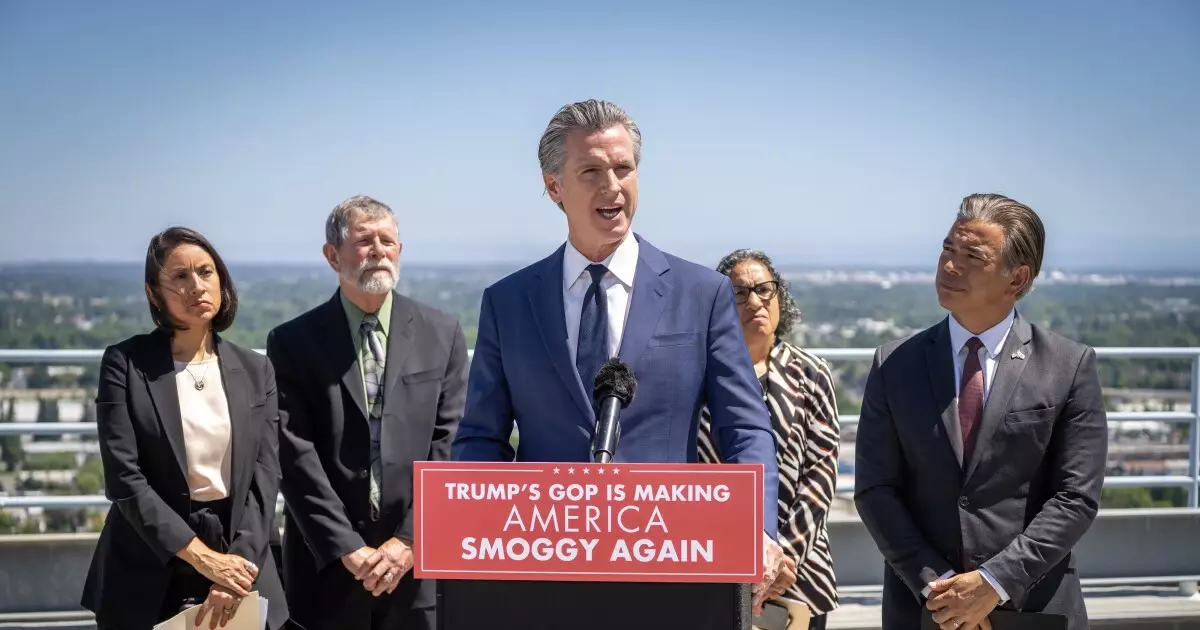In a contentious political landscape where environmental concerns are frequently overshadowed by partisan agendas, California’s decision to sue the Trump administration marks a critical juncture in the discourse over air quality and public health. What’s at stake goes beyond the state’s stringent vehicle emission rules; it’s about the fundamental right of a state to protect its residents from pollution in the face of federal encroachment that prioritizes politics over people. This latest lawsuit, soon to be filed if the anticipated bill is signed, represents California’s 23rd legal challenge against Trump’s policies—and it’s a necessary stand against what can only be described as a regressive assault on decades of progress.
A Dual Threat: Public Health and the Environment
California’s evolving landscape of vehicle emissions regulations led by Governor Gavin Newsom is not just a crusade for cleaner air; it is a direct action to combat an impending public health crisis. The initiative to phase out gasoline and diesel vehicles by 2035 responds to the state’s persistent air quality issues, a plight exacerbated by climate change. With millions of residents in the San Joaquin Valley and Los Angeles grappling with severe pollution-related ailments, the stakes couldn’t be higher. Trump’s administration, in pushing to dismantle these regulations, doesn’t just threaten state autonomy; it endangers the health of Californians, placing partisan ideology above the well-being of its citizens.
Everyone deserves clean air, yet California persists in claiming notoriety for housing several cities ranked among the worst for air pollution. Not only does this reflect a failure to acknowledge the urgent public health narratives, but it also emphasizes the importance of robust regulations that history has shown can work—even in a polarized political environment. Recognizing that presidents of the past, regardless of party affiliation, accepted the importance of regulating pollution underscores how far we have diverged from prioritizing health and environmental integrity.
Political Hijacking of Environmental Regulations
In the political theater of the Senate, Senate Majority Leader John Thune’s maneuvering to push through this controversial legislation reeks of desperation. By circumventing the Senate parliamentarian and defying both historical and legal precedents, the Republican party is not only undermining the integrity of the legislative process but jeopardizing the fundamental rights of states to enact regulations in tune with their local realities. The Congressional Review Act, utilized to repeal regulations with a simple majority, poses a dangerous precedent that can be employed to erode not only environmental protections but a host of other health and safety regulations—perfectly illustrating how political games can crumple vital public safeguards.
Moreover, Attorney General Rob Bonta articulates a sentiment felt by many Californians: the federal government’s relentless push against the Golden State’s environmental efforts is not merely illegal—it is a calculated move that trivializes the lives of millions. Seeing Trump’s administration criminalize the proactive steps taken to safeguard air quality reflects a recommended playbook for fostering environmental negligence and redirects the conversation toward swelling smoke clouds brought by oil companies and other profiteers invested in maintaining the status quo against progressive environmental changes.
The Broader Implications for Economic Competitiveness
In light of this political skirmish, it is crucial to consider the long-term effects on national competitiveness. Governor Newsom’s assertion that this lapse in environmental governance puts America’s standing against China at risk is profound. As global trends collectively pivot toward electrification and sustainable energy, America cannot afford to be perceived as a laggard. Allowing the federal government to stifle states’ innovations in electric vehicle (EV) technologies and clean air initiatives reinforces a troubling narrative: that our nation prefers short-term convenience over long-term prosperity and leadership in an industry poised to dominate the future.
Directing fruitful investments into California’s EV market raises potential economic benefits with job creation in manufacturing and infrastructure—benefits that could reverberate well beyond state lines. The Trump administration’s stance, instead, aligns with an antiquated economy that favors fossil fuels primarily used in states wishing to maintain the power of old industries. The profound irony lies in undoing work initiated during the presidencies of Nixon and Reagan, figures linked to significant advancements in environmental legislation yet now overshadowed by a party unwilling to embrace progressive values.
Understanding that today’s policies set the trajectory for generations to come, it becomes apparent that this legal battle is not simply a clash of interests; it is a declaration that clean air, health, and economic viability should reign supreme over political performance or short-sighted gains. As California embarks on its lawsuit, the stakes are high, not only for the residents of the state but for the nation that aspires to lead in a new era of environmental consciousness.

